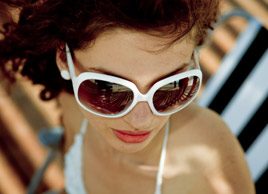Are cheap sunglasses safe?
Sunglasses might be a fashion statement, but they should also protect your eyes. Find out what to look for when shopping and whether price matters

Source: Best Health Magazine, Summer 2009
What UV rays can do to your eyes
Without UV-protective sunglasses, you are exposing your eyes to hazardous ultra-violet (UV) light that, over time, may lead to cataracts (a clouding of the lens) and macular degeneration (the leading cause of vision loss in the elderly).
‘It’s difficult to get this message across, because sunglasses have been marketed as fashion items rather than eye protection,’ says Ralph Chou, an associate professor in the school of optometry at the University of Waterloo. ‘And there’s no tell-tale sign your eyes are accumulating sun damage until things go wrong with your vision.’
Wearing sunglasses that do not provide enough UV protection may be as harmful as not wearing any at all, explains Praveena Gupta, an optometrist in the ophthalmology and visual sciences department at the University of Texas Medical Branch. ‘Your pupils constrict in bright light and dilate in dim light, so when you wear sunglasses, they dilate. Without adequate UV protection, you are letting more of the harmful UV light into your eyes.’
How good are most sunglasses?
The good news: Most sunglasses do provide enough UV protection, says Stephen Dain, director of the optics and radiometry laboratory at Australia’s University of New South Wales. ‘We test about 2,000 pairs a year, and failure to meet standards is less than one percent.’
Still, you don’t want to take any chances. When shopping, look for a label that states they provide UV 400 or at least 99 percent UVB and 95 percent UVA protection. Ideally, they will also have an ‘ANSI Z80.3’ sticker, which shows the manufacturer paid a licensing fee to the American National Standards Institute (ANSI), guaranteeing the product has met set criteria. ‘If you see this tag and the sunglasses are made by a quality manufacturer, the lenses will block UV light,’ says Chou, who, along with Dain, sits on a committee that’s drafting international standards. If sunglasses don’t have such stickers, or are being sold by a less-than-reliable vendor, don’t risk it.
What you get for the price
So does price matter? Sunglasses with hefty price tags aren’t necessarily better than the $20 variety. ‘UV protection costs only pennies so you can get it at any price,’ says Chou. ‘But inexpensive lenses may have marginal optical quality. This won’t do any damage, but the distortion can cause headaches or dizziness that can leave you feeling miserable.’
When you buy pricier models, you’re getting a lens with good optics that filters 100 percent UV light and has several lens coatings, says Gupta.
Find the best pair for you
UV protection should be top priority, but other features also make for healthy eyes.
‘ Size matters
The larger lens in Jackie-O-style frames block more UV rays than small ones. Wider arms and wraparounds also keep damaging light from getting into your eyes from the sides.
‘ Lens colour
For driving, grey/brown or grey/green lenses offer both glare protection and ability to see traffic light colours. The darkness of a lens is not related to its level of UV protection.
‘ Polarizing lenses
When light reaches a surface such as water, most of the light waves pass through but a small fraction is reflected, interfering with our ability to see details. These lenses block reflected light, reducing glare’good for people working or playing around water.
‘ Anti-reflective coating
Applied to the back surface of a lens, it prevents ‘ghost reflections’ that can interfere with vision.
‘ Mirror coating
A reflective metal coating decreases the light passing through the lens’ideal in water or snow conditions.
‘ Prescription
Photochromic lenses’almost colourless in dim light and dark in sunlight’can include UV protection. ‘They darken in 30 to 60 seconds, and take five minutes to fully lighten,’ says Chou. Another option? Clip-ons that fit over regular glasses. (While some contact lenses filter out UV, non-prescription sunglasses are required for full eye protection.)
This article was originally titled "The Truth About Sunglasses," in the Summer 2009 issue of Best Health. Subscribe today to get the full Best Health experience’and never miss an issue!’and make sure to check out what’s new in the latest issue of Best Health.




